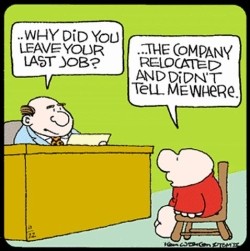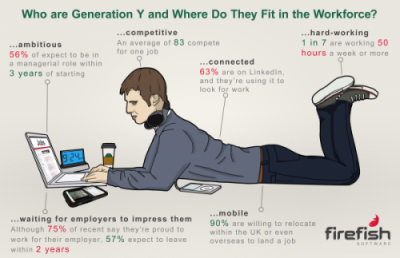What Did I Learn From My First Gen Y and Gen Z Hire

I know, I know. This is already a third work-related article in a row and this is not even a recruitment blog. I don’t plan my articles much in advance, so I guess there has just been work work work on my mind lately.
I’d like to share my first Millennial and Gen Z hire with the world … and the things that I learnt from it.
Last week I interviewed five writers. It wasn’t rocket science, somehow I just knew immediately who’s the one … it’s the gut feeling!
If you can combine that gut feeling with some apparent personality traits – you can easily be able to make the best choice!
When I say “gut feeling” I mean likability and the feeling of connection with the person I’m talking to. I understand that gut feeling is subjective, but I also know that subjectivity is just as important as objectivity, because when you end up working with that person every day, you may as well get along.
Apart from the subjective gut feeling, there are simple traits that set an Average Joe apart from the Star:
– Attitude
– Reasoning abilities
– Situation handling skills
These personality traits are pretty obvious when you speak to people! They either have it or not.
I like positive people, who believe that they can make things happen (note that it doesn’t mean that they can’t fail at times; as long as they hope and do everything they can to succeed, it’s all good).
You need and want to make things happen for them to ACTUALLY happen, so can-do attitude is a certain must!
I also like people, who can quickly come up with logical conclusions and connections between different things in the world. That shows wider knowledge, curiosity, and intelligence.
And lastly – situation handling. You can’t be perfect all the time, and that is fine, but coming out of situations with eye-opening, clever solutions, or even humour, is just refreshing and makes you memorable.
Things Millennials and Gen Z should do during the interview
– Showcase soft Skills with real examples
- Highlight communication, adaptability, and problem-solving through real experiences, whether from school, part-time jobs, or extracurriculars.
- Be specific—describe situations where you took initiative or helped resolve conflicts, as hiring managers value these “soft” yet crucial skills.
2. Demonstrate research on the company and industry
- Go beyond the basics: mention current industry trends or specific projects within the company.
- Discuss how you see the company’s goals aligning with your own career aspirations, showing that you’ve considered how you’ll grow there.
3. Emphasise digital proficiency and tech skills
- Gen Z is known for digital fluency, so emphasise relevant technical skills or tools (even social media, CRM systems, or content management).
- If the job requires it, bring up times you’ve used specific tools to solve a problem, showing your ability to contribute immediately.
4. Ask insightful questions
- Avoid asking only generic questions. Instead, ask about:
- Company culture in specific terms: “How does your team approach collaboration, especially with remote work?”
- Opportunities for growth: “What learning resources or training programs do you have?”
- Asking questions about challenges the team is currently facing shows interest in tackling real-world issues.
5. Maintain strong body language and eye contact
- Body language can be a dealbreaker—practice sitting up straight, making eye contact (even on video calls), and maintaining a calm, steady tone.
- A warm but professional smile can help you appear approachable and confident.
6. Show a willingness to learn and adapt
- Highlight a time you adapted to a new situation or learned something quickly.
- Mentioning a new skill you’re currently learning can signal that you’re proactive about personal and professional growth.
8. Show authenticity and emotional intelligence
- Be yourself in a polished way—employers appreciate authenticity and a genuine personality.
- Listen actively during the interview and respond thoughtfully to show emotional intelligence, a highly sought-after skill.
I believe that if you treat people nicely and let them think big, they will. Make them feel like they are part of the company’s success and they will give more. Treat them like faceless employees and you will get ones.
People, even though so different, are essentially the same. We all want to love, feel loved/liked, and get satisfaction and appreciation at work and in our personal life.
Things Millennials and Gen Z shouldn’t do during the interview
1. Avoid using too much casual language or slang
- Professional environments typically expect formal or polished language. Steer clear of slang, filler words (“like,” “you know”), and overly casual phrases.
- If you tend to use informal language, practice a more professional tone in your responses, and consider prepping answers to common interview questions in advance.
2. Don’t bring up negative experiences with past employers
- Even if a previous job was challenging, avoid complaining or speaking negatively about former employers. It’s easy for this to come across as unprofessional or a sign that you’re difficult to work with.
- Instead, frame experiences positively or as learning opportunities, emphasising what you gained rather than what went wrong.
3. Don’t assume familiarity or become too casual with the interviewer
- Many Millennials and Gen Z candidates can fall into the trap of being overly casual, especially with friendly interviewers.
- While being warm and personable is great, maintain professional boundaries—avoid calling the interviewer by a nickname or making jokes that could be misunderstood.
4. Don’t be too focused on remote or hybrid work from the start
- While remote work can be a priority, leading with this can make it seem like the flexibility is more important than the role itself.
- If remote or hybrid work isn’t listed as an option in the job posting, avoid asking about it until later in the interview process.
5. Avoid rushing or overloading your answers
- Nervousness can cause candidates to rush through answers or give overly detailed responses. This can make you seem unprepared or scatterbrained.
- Practice concise answers, especially to common questions, and take a pause before responding to keep your thoughts clear and your delivery confident.
10. Don’t forget to send a thank-you note
- While follow-up etiquette may seem outdated, sending a thank-you email is still essential. Failing to do this can signal a lack of interest or professionalism.
- Keep it brief, thanking them for their time and reinforcing your enthusiasm for the role.




